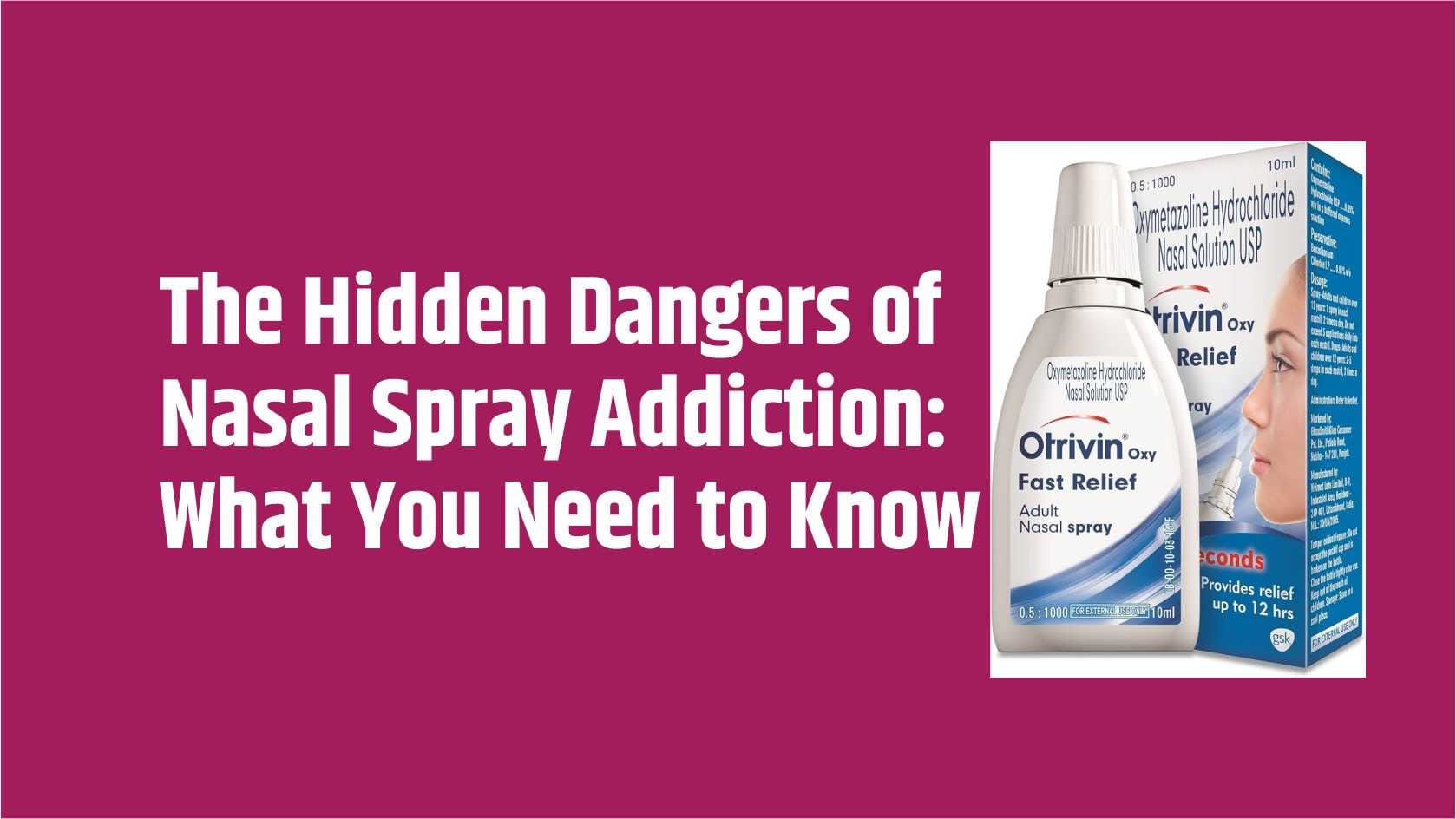Introduction
You’ve probably experienced it — that uncomfortable, congested feeling that makes breathing through your nose feel impossible. You reach for your trusted nasal spray, squeeze a few drops, and like magic — instant relief.
Nasal sprays like Otrivin, Nasivion, Dristan, and Nasoclear Plus are found in nearly every household. They’re marketed as quick-fix solutions for blocked noses, and in the short term, they work brilliantly. But what most users don’t realize is that these sprays, when used beyond the recommended 3–5 days, can cause more harm than good.
In fact, they can create a cycle of dependency, lead to chronic nasal inflammation, and worsen your original condition — a phenomenon known as rebound congestion.
In this blog, we’ll explore:
- How nasal sprays work
- Why they become addictive
- The long-term health effects
- When to stop using them
- Safe alternatives
- And how to treat the underlying cause of your congestion
Let’s dive in.
How Nasal Sprays Work
Most over-the-counter decongestant nasal sprays contain xylometazoline or oxymetazoline. These are vasoconstrictors — drugs that shrink the swollen blood vessels in the nasal passages. When the vessels shrink, airflow improves and the sensation of congestion disappears.
Why They Feel Like Magic
The onset of relief is quick — usually within minutes. That immediate effectiveness is what makes people believe these sprays are harmless. But there’s a catch: the relief is temporary, and repeated use starts a harmful cycle.
The Slippery Slope: From Relief to Dependency
Using a decongestant nasal spray for more than 3 consecutive days can lead to what doctors call rebound congestion (also known as rhinitis medicamentosa). Here’s what happens:
- You use the spray → Blood vessels shrink → You breathe better.
- The effect wears off → Blood vessels swell even more.
- Your nose feels stuffier → You use the spray again.
And so the cycle continues.
The Side Effects of Long-Term Nasal Spray Use
1. Rebound Congestion
Your nose becomes dependent on the spray. Once the medication wears off, the congestion returns with greater intensity, prompting further use.
2. Behavioural Dependence
It becomes a habit. You may find yourself using it before sleep, before a meeting, while traveling, or simply because you’re anxious about potential blockage.
3. Chronic Nasal Inflammation
Prolonged use leads to:
- Dryness
- Crusting
- Bleeding
- Permanent swelling of nasal tissues
This condition is difficult to reverse and often requires long-term medical treatment or even surgery.
4. High Blood Pressure and Cardiovascular Risks
These sprays can increase blood pressure by narrowing blood vessels systemically, not just in the nose. They’re particularly dangerous for people with hypertension, heart disease, or thyroid problems.
5. Suppressed Natural Defense Mechanisms
Overusing sprays interferes with the nose’s natural defense system — the mucous layer and cilia that trap and expel viruses, bacteria, and allergens.
The Bigger Problem: Ignoring the Root Cause
Most people never find out why their nose is blocked in the first place.
Is it:
- A viral infection?
- Allergic rhinitis?
- Sinusitis?
- A deviated septum?
Using a nasal spray simply masks the symptom instead of treating the cause. This delays proper diagnosis and effective treatment.
Real-Life Signs You Might Be Addicted
- You carry a nasal spray in your bag or keep it by your bedside.
- You panic or feel anxious without it.
- You’ve been using it for weeks or months.
- Your congestion returns soon after the effect wears off.
- Other treatments (like allergy meds) aren’t working effectively anymore.
If any of these apply, it’s time to take action.
What Doctors Recommend
Step 1: Stop the Spray
This may be difficult at first, but going cold turkey is often the most effective way. The congestion will likely worsen for a few days — this is normal and temporary.
Step 2: Switch to a Safer Alternative
- Saline Nasal Sprays or Rinses: Help moisten nasal passages without causing dependency.
- Steam Inhalation: Naturally relieves congestion.
- Antihistamines: For allergic rhinitis.
- Nasal Steroids: Prescribed by doctors to reduce inflammation safely.
- Hydration: Drink lots of fluids to thin mucus.
Step 3: Consult an ENT Specialist
An ENT (Ear, Nose, Throat) doctor can:
- Identify the root cause of your nasal issues
- Suggest medications or allergy testing
- Recommend surgery if there’s a structural problem
A Note on Children and Elderly Patients
Over-the-counter nasal sprays should be used with extreme caution in:
- Children under 6
- Pregnant women
- Elderly patients with heart or blood pressure problems
Even short-term use should be guided by a physician.
Prevention: How to Treat a Blocked Nose the Right Way
- Don’t self-medicate repeatedly.
- Use decongestant sprays for a maximum of 3 days.
- Explore natural remedies like steam, ginger tea, and humidifiers.
- Track your symptoms — when do they appear? After dust exposure? In the morning?
- Get tested for allergies if symptoms persist.
Final Thoughts
Nasal sprays may seem like a quick and harmless fix, but long-term use can lead to addiction, chronic inflammation, and worsening nasal health. The temporary relief they provide often masks deeper problems that require proper diagnosis.
If you or someone you know is stuck in the cycle of nasal spray dependency — it’s not too late to stop. Talk to a doctor, explore safer alternatives, and treat the root cause rather than the symptom.
- Introduction
- How Nasal Sprays Work
- The Slippery Slope: From Relief to Dependency
- The Side Effects of Long-Term Nasal Spray Use
- The Bigger Problem: Ignoring the Root Cause
- Real-Life Signs You Might Be Addicted
- What Doctors Recommend
- A Note on Children and Elderly Patients
- Prevention: How to Treat a Blocked Nose the Right Way
- Final Thoughts


